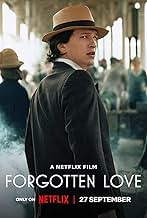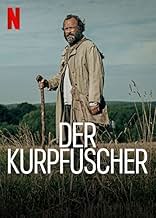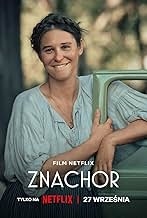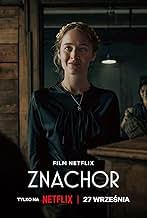IMDb-BEWERTUNG
7,5/10
12.865
IHRE BEWERTUNG
Ein einst angesehener Chirurg, der seine Familie und sein Gedächtnis verloren hat, bekommt eine zweite Chance, als er eine Person aus seiner Vergangenheit wiedersieht.Ein einst angesehener Chirurg, der seine Familie und sein Gedächtnis verloren hat, bekommt eine zweite Chance, als er eine Person aus seiner Vergangenheit wiedersieht.Ein einst angesehener Chirurg, der seine Familie und sein Gedächtnis verloren hat, bekommt eine zweite Chance, als er eine Person aus seiner Vergangenheit wiedersieht.
- Regie
- Drehbuch
- Hauptbesetzung
- Auszeichnungen
- 8 Nominierungen insgesamt
Empfohlene Bewertungen
I took a chance on this movie and decided to watch it without seeing a trailer first, and I'm so glad I did. I loved every minute of it! The plot and story line gave me all the feels. One moment I wanted to cry, other moments I wanted to throw my remote at the screen, and in a couple scenes I wanted to get up and dance! Some characters melted my heart while others infuriated me. It was so beautifully balanced and entertaining.
In some ways it reminded me of Les Miserables, but with a completely different storyline.
From start to finish, I loved it. I'll definitely be looking for more movies like this one.
In some ways it reminded me of Les Miserables, but with a completely different storyline.
From start to finish, I loved it. I'll definitely be looking for more movies like this one.
8.0 stars.
This will be an instant classic I'm sure of it. This film evoked deep emotions to my core. The screenplay was perfection. The soundtrack was superb. The sets were authentic and noteworthy. The acting was spot on.
The only downside for most of the audience is the language, which is Polish. As far as I know, this is one of the least spoken of the main languages in the developed world, so most will have to read the subtitles or utilize the dubbing. And some of the dubbing is lost in translation, the phrases and slang are outdated (slightly) and many of the voice actors did not capture the intended emphasis or pauses as I would have desired. Notwithstanding, I was still profoundly moved by 'Forgotten Love' ('Znachor').
Something about the Polish culture must take some extra hard work to translate into a Western mindset, however I was extremely entertained. Some of the scenes actually reminded me of great epic films of yesteryear. There are glimpses of the handiwork of many a famous director. And I must reiterate the soundtrack was brilliant and very moving. Many aspects are award-worthy, and hopefully this receives some nominations.
If you have zero trouble with dubbed films, you absolutely must see this. Something about the ambience and the emotional response it brings is difficult to explain without simply advising you to give this film a try and see for yourself.
I must emphasize that I don't want you to raise your hopes too high, because there are some parts that make little sense, slow moments interspersed throughout, maybe some awkward segues between pivotal scenes. On the other hand, there were also scenes which reminded me of 'Legends of the Fall', or perhaps a Jane Austen adaptation, or some great American films from the 1950's, 60's and 70's; and one critic mentioned it is akin to 'Les Miserables' and I wholeheartedly agree.
This will be an instant classic I'm sure of it. This film evoked deep emotions to my core. The screenplay was perfection. The soundtrack was superb. The sets were authentic and noteworthy. The acting was spot on.
The only downside for most of the audience is the language, which is Polish. As far as I know, this is one of the least spoken of the main languages in the developed world, so most will have to read the subtitles or utilize the dubbing. And some of the dubbing is lost in translation, the phrases and slang are outdated (slightly) and many of the voice actors did not capture the intended emphasis or pauses as I would have desired. Notwithstanding, I was still profoundly moved by 'Forgotten Love' ('Znachor').
Something about the Polish culture must take some extra hard work to translate into a Western mindset, however I was extremely entertained. Some of the scenes actually reminded me of great epic films of yesteryear. There are glimpses of the handiwork of many a famous director. And I must reiterate the soundtrack was brilliant and very moving. Many aspects are award-worthy, and hopefully this receives some nominations.
If you have zero trouble with dubbed films, you absolutely must see this. Something about the ambience and the emotional response it brings is difficult to explain without simply advising you to give this film a try and see for yourself.
I must emphasize that I don't want you to raise your hopes too high, because there are some parts that make little sense, slow moments interspersed throughout, maybe some awkward segues between pivotal scenes. On the other hand, there were also scenes which reminded me of 'Legends of the Fall', or perhaps a Jane Austen adaptation, or some great American films from the 1950's, 60's and 70's; and one critic mentioned it is akin to 'Les Miserables' and I wholeheartedly agree.
The film attracts your attention with its emotional depth. While we follow what is happenning to Doctor Wilczur, we also witness the warm, hopeful love story of Marysia and Count Czynski. The cinematography, set design and music are quite impressive. Peaceful rural landscapes, villages, peasants... Everything and everyone in this movie is very native and convincing, every scene reveals the hard work done. The performances of the lead actors Leszek Lichota and Maria Kowalska add originality to their characters, I admire both of them pretty much. My only negative comment about the movie is that the ending seemed a bit rushed, they could have made a great mini-series from this movie..
Znachor adaptation directed by Jerzy Hoffmann remains one of most touching films of my childhood.
So, the curiosity, some serious reserves, the certitude than Jerzy Binczycky has no pair but provocated by the courage of Michael Gazda, I saw it.
And it is far to be dissapointed experience. In fact, two virtues define it - the splendid portrait of Poland life between wars and the high loyalty to the novel.
Sure, the acting is basic virtue and the story grows up with inspired crafted dramatism. But the second virtue is the wise recreation of atmosphere, using old buildings and clothes, nice cinematography , fair use of nature.
The story is familiar and its dramatic reflexes, good use of humor drops, the dialogue are great good points. And, indeed, Leszek Lichota is fair option for Professor.
In short, just a beautiful gift.
So, the curiosity, some serious reserves, the certitude than Jerzy Binczycky has no pair but provocated by the courage of Michael Gazda, I saw it.
And it is far to be dissapointed experience. In fact, two virtues define it - the splendid portrait of Poland life between wars and the high loyalty to the novel.
Sure, the acting is basic virtue and the story grows up with inspired crafted dramatism. But the second virtue is the wise recreation of atmosphere, using old buildings and clothes, nice cinematography , fair use of nature.
The story is familiar and its dramatic reflexes, good use of humor drops, the dialogue are great good points. And, indeed, Leszek Lichota is fair option for Professor.
In short, just a beautiful gift.
International audiences should know where the negative opinions of some Polish film reviewers come from. Well, the book Znachor (The Quack), written in 1937 by Tadeusz Dolega-Mostowicz (initially as a screenplay), lived to see three screen adaptations. The first one, directed by Michal Waszynski, was also filmed in 1937, the second one, directed by Jerzy Hoffman, premiered in 1981, and this one, albeit a rather loose adaptation of the novel (especially when it comes to the character of Professor Dobraniecki, who is a disgusting character in the book) gained recognition from Polish audiences and acquired the status of an icon of Polish cinematography, and icons are not touched in Poland. At least that's what some people think, especially those who can't tear themselves away from what was, no matter what the quality of the new one is.
Meanwhile, the new adaptation (yes adaptation, not remake) of the novel "The Quack", which has the international title "Forgotten Love", is a brilliantly shot, charming film about love, goodness, loyalty to principles and a bit about Poland as it was between the World Wars. Wonderful cinematography, great music interwoven with folk songs, set and costume design, and excellent acting (there really is no weak role in this film) make you travel back in time to the first half of the 20th century for 2 hours and 20 minutes feeling as if you are almost there, in the beautiful Polish countryside. You will love the characters and identify with them, and when the film is over you will want to watch it again. In the previous version, Hoffman made the rascal Dobraniecki into a knight on a white horse who rescues Professor Wilczur from his oppression; in this version, this miserable careerist and scoundrel remains himself to the end, just as in the book. Fans of Hoffman's film will not find the iconic courtroom scene in Forgotten Love, but this could not have happened if the authors had decided to be consistent with Dobraniecki's character. Instead, there is a new version of it, in my opinion more logical, beautiful and truly moving. And the ending? Also different, also consistent with the adaptation adopted and really beautiful. So, don't look at the frustrators and retrogrades, just watch this film and I assure you that not only will you not regret it, but you will experience more than 2 hours of emotion, laughter, reflection and a bit of history, all in beautiful landscapes and scenery that will not return. Highly recommended.
Meanwhile, the new adaptation (yes adaptation, not remake) of the novel "The Quack", which has the international title "Forgotten Love", is a brilliantly shot, charming film about love, goodness, loyalty to principles and a bit about Poland as it was between the World Wars. Wonderful cinematography, great music interwoven with folk songs, set and costume design, and excellent acting (there really is no weak role in this film) make you travel back in time to the first half of the 20th century for 2 hours and 20 minutes feeling as if you are almost there, in the beautiful Polish countryside. You will love the characters and identify with them, and when the film is over you will want to watch it again. In the previous version, Hoffman made the rascal Dobraniecki into a knight on a white horse who rescues Professor Wilczur from his oppression; in this version, this miserable careerist and scoundrel remains himself to the end, just as in the book. Fans of Hoffman's film will not find the iconic courtroom scene in Forgotten Love, but this could not have happened if the authors had decided to be consistent with Dobraniecki's character. Instead, there is a new version of it, in my opinion more logical, beautiful and truly moving. And the ending? Also different, also consistent with the adaptation adopted and really beautiful. So, don't look at the frustrators and retrogrades, just watch this film and I assure you that not only will you not regret it, but you will experience more than 2 hours of emotion, laughter, reflection and a bit of history, all in beautiful landscapes and scenery that will not return. Highly recommended.
Wusstest du schon
- WissenswertesRemake of the 1981 film Der Kurpfuscher (1982), The Quack.
- PatzerPolish vehicle registration plates from before 1937 should have red letters (KL in this case, meaning Kielce voivodeship), not black (what is difficult to learn from black and white photos).
Top-Auswahl
Melde dich zum Bewerten an und greife auf die Watchlist für personalisierte Empfehlungen zu.
- How long is Forgotten Love?Powered by Alexa
Details
- Laufzeit2 Stunden 20 Minuten
- Farbe
- Sound-Mix
- Seitenverhältnis
- 2.35 : 1
Zu dieser Seite beitragen
Bearbeitung vorschlagen oder fehlenden Inhalt hinzufügen


![Trailer [OV] ansehen](https://m.media-amazon.com/images/M/MV5BOWE0MTBhNmQtYjVkMi00ODU1LWE1ZDYtNmMyMzFiODU3MzA3XkEyXkFqcGdeQXRyYW5zY29kZS13b3JrZmxvdw@@._V1_QL75_UX500_CR0)
































